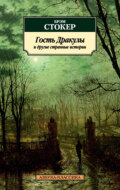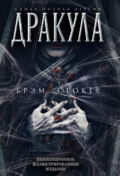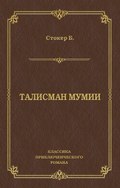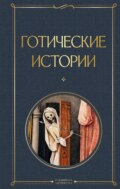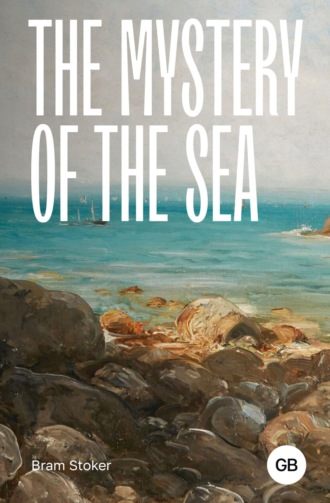
Брэм Стокер
The Mystery of the Sea / Тайна моря
Chapter III. An Ancient Rune
On the next day I rode on my bicycle to Peterhead, and walked on the pier. It was a bright clear day, and a fresh northern breeze was blowing. The fishing boats were ready to start at the turn of the tide; and as I came up the first of them began to pass out through the harbour mouth. Their movement was beautiful to see; at first slowly, and then getting faster as the sails were hoisted, till at last they swept through the narrow entrance, scuppers under, righting themselves as they swung before the wind in the open sea. Now and again a belated smacksman came hurrying along to catch his boat before she should leave the pier.
The eastern pier of Peterhead is guarded by a massive wall of granite, built in several steps or tiers, which breaks the fury of the gale. When a northern storm is on, it is a wild spot; the waves dash over it in walls of solid green topped with mountainous masses of foam and spray. But at present, with the July sun beating down, it was a vantage post from which to see the whole harbour and the sea without. I climbed up and sat on the top, looking on admiringly, and lazily smoked in quiet enjoyment. Presently I noticed some one very like Gormala come hurrying along the pier, and now and again crouching behind one of the mooring posts. I said nothing but kept an eye on her, for I supposed that she was at her usual game of watching some one.
Soon a tall man strode leisurely along, and from every movement of the woman I could see that he was the subject of her watching. He came near where I sat, and stood there with that calm unconcerned patience which is a characteristic of the fisherman.
He was a fine-looking fellow, well over six feet high, with a tangled mass of thick red-yellow hair and curly, bushy beard. He had lustrous, far-seeing golden-brown eyes, and massive, finely-cut features. His pilot-cloth trousers spangled all over with silver herring scales, were tucked into great, bucketboots. He wore a heavy blue jersey and a cap of weazel skin. I had been thinking of the decline of the herring from the action of the trawlers in certain waters, and fancied this would be a good opportunity to get a local opinion. Before long I strolled over and joined this son of the Vikings. He gave it, and it was a decided one, uncompromisingly against the trawlers and the laws which allowed them to do their nefarious work. He spoke in a sort of old-fashioned, biblical language which was moderate and devoid of epithets, but full of apposite illustration. When he had pointed out that certain fishing grounds, formerly most prolific of result to the fishers, were now absolutely worthless he ended his argument:
“And, sure, good master, it stands to rayson. Suppose you be a farmer, and when you have prepared your land and manured it, you sow your seed and plough the ridges and make it all safe from wind and devastatin' storm. If, when the green corn be shootin' frae the airth, you take your harrow and drag it ath'art the springin' seed, where be then the promise of your golden grain?”
For a moment or two the beauty of his voice, the deep, resonant, earnestness of his tone and the magnificent, simple purity of the man took me away from the scene. He seemed as though I had looked him through and through, and had found him to be throughout of golden worth. Possibly it was the imagery of his own speech and the colour which his eyes and hair and cap suggested, but he seemed to me for an instant as a small fi-gure projected against a background of rolling upland clothed in ripe grain. Round his feet were massed the folds of a great white sheet whose edges faded into air. In a moment the image passed, and he stood before me in his full stature.
I almost gasped, for just behind him, where she had silently come, stood Gormala, gazing not at the fisherman but at me, with eyes that positively blazed with a sort of baleful eagerness. She was looking straight into my eyes; I knew it when I caught the look of hers.
The fisherman went on talking. I did not, however, hear what he was saying, for again some mysterious change had come over our surroundings. The blue sea had over it the mystery of the darkness of the night; the high noon sun had lost its fiery vigour and shone with the pale yellow splendour of a full moon. All around me, before and on either hand, was a waste of waters; the very air and earth seemed filmed with moving water, and the sound of falling waters was in my ears. Again, the golden fisherman was before me for an instant, not as a moving speck but in full size now he lay prone; limp and lifeless, with waxen cold cheeks, in the eloquent inaction of death. The white sheet-I could see now that it was a shroud-was around him up to his heart. I seemed to feel Gormala's eyes burning into my brain as I looked. All at once everything seemed to resume its proper proportion, and I was listening calmly to the holding forth of the Viking.
I turned instinctively and looked at Gormala. For an instant her eyes seemed to blaze triumphantly; then she pulled the little shawl which she wore closer round her shoulders and, with a gesture full of modesty and deference turned away. She climbed up the ridges of the harbour wall and sat looking across as at the sea beyond, now studded with a myriad of brown sails.
A little later the stolid indifference as to time slipped all at once from the fisherman. He was instinct with life and action, and with a touch of his cap and a “Farewell good Master!” stood poised on the very edge of the pier ready to spring on a trim, weather-beaten smack which came rushing along almost grazing the rough stone work. It made our hearts jump as he sprang on board and taking the tiller from the hand of the steersman turned the boat's head to the open sea. As she rushed out through the harbour mouth we heard behind us the voice of an old fisherman who had hobbled up to us:
“He'll do that once too often! Lauchlane Macleod is like all these men from Uist and the rest of the Out Islanders. They don't care 'naught about naught.'”
Lauchlane Macleod! The very man of whom Gormala had prophesied! The very mention of his name seemed to turn me cold.
After lunch at the hotel I played golf on the links till evening drew near. Then I got on my bicycle to return home. I had laboured slowly up the long hill to the Stirling quarry when I saw Gormala sitting on the roadside on a great boulder of red granite. She was evidently looking out for me, for when I came near she rose up and deliberately stood in the roadway in my path. I jumped off my wheel and asked her point blank what she wanted with me so much that she stopped me on the road.
Gormala was naturally an impressive figure, but at present she looked weird and almost unearthly. Her tall, gaunt form lit by the afterglow in a soft mysterious light was projected against the grey of the darkening sea, whose sombreness was emphasised by the brilliant emerald green of the sward which fell from where we stood to the jagged cliff-line.
The loneliness of the spot was profound. From where we stood not a house was to be seen, and the darkening sea was desert of sails. It seemed as if we two were the only living things in nature's vast expanse. To me it was a little awesome. Gormala's first mysterious greeting when I had seen the mourning for the child, and her persistent following of me ever since, had begun to get on my nerves. She had become a sort of enforced condition to me, and whether she was pre-sent in the flesh or not, the expectation or the apprehension of her coming-I hardly knew which it was-kept my thoughts perpetually interested in her. Now, her weird, statuesque attitude and the scene around us finished my intellectual subjugation. The weather had changed to an almost inconceivable degree. The bright clear sky of the morning had become darkly mysterious, and the wind had died away to an ominous calm. Nature seemed altogether sentient, and willing to speak directly to a man in my own receptive mood. The Seer-woman evidently knew this, for she gave fully a minute of silence for the natural charm to work before she spoke. Then in a solemn warning voice she said:
“Time is flying by us; Lammas-tide is nigh.” The words impressed me, why I know not; for though I had heard of Lammas-tide I had not the smallest idea of what was meant by it. Gormala was certainly quick with her eyes-she had that gypsy quality in remarkable degree-and she seemed to read my face like an open book. There was a suppressed impatience in her manner, as of one who must stop in the midst of some important matter to explain to a child whose aid is immediately necessary:
“Ye no ken why? Is it that ye dinna heed o' Lammas-tide, or that ye no ken o' the prophecy of the Mystery of the Sea and the treasures that lie hid therein.” I felt more than ever abashed, and that I should have known long ago those things of which the gaunt woman spoke, towering above me as I leaned on my wheel. She went on:
“An' ye no ken, then listen and learn!” and she spoke the following rune in a strange, staccato cadence which seemed to suit our surroundings and to sink into my heart and memory so deep that to forget would be impossible:
“To win the Mystery o' the Sea,
“An' learn the secrets that there be, “Gather in one these weirds three:
“A gowden moon on a flowin' tide,
“And Lammas floods for the spell to bide;
“And a gowden mon wi' death for his bride.”
There was a long pause of silence between us, and I felt very strangely. The sea before me took odd, indefinite shape. It seemed as though it was of crystal clearness, and that from where I gazed I could see all its mysteries. That is, I could see so as to know there were mysteries, though what they were individually I could not even dream. The past and the present and the future seemed to be mingled in one wild, chaotic, whirling dream, from the mass of which thoughts and ideas seemed now and again to fly out unexpectedly on all sides as do sparks from hot iron under the hammer. Within my heart grew vague indefinite yearnings, aspirations, possibilities. There came a sense of power so paramount that instinctively I drew myself up to my full height and became conscious of the physical vigour within me. As I did so I looked around and seemed to wake from a dream.
Naught around me but the drifting clouds, the silent darkening land and the brooding sea. Gormala was nowhere to be seen.
Chapter IV. Lammas Floods
When I got to Cruden it was quite dark. I had lingered by the way thinking of Gormala MacNiel and all the queer kind of mystery in which she seemed to be enmeshing me. The more I thought, the more I was puzzled; for the strangest thing of all to me was that I understood part of what seemed to be a mystery. For instance I was but imperfectly acquainted with the Seer-woman's view of what was to be the result of her watching of Lauchlane Macleod. I knew of course from her words at our first conversation that in him she recognised a man doomed to near death according to the manifestation of her own power of Second Sight; but I knew what she did not seem to, that this was indeed a golden man. From the momentary glimpse which I had had in that queer spell of trance, or whatever it was which had come to me on the pier head, I had seemed to know him as a man of gold, sterling throughout. It was not merely that his hair was red gold and that his eyes might fairly be called golden, but his whole being could only be expressed in that way; so that when Gormala spoke, the old rhyme seemed at once a prime factor in the group of three powers which had to be united before the fathoming of the Mystery of the Sea. I accordingly made up my mind to speak with the Seer-woman and to ask her to explain. My own intellectual attitude to the matter interested me. I was not sceptical, I did not believe; but I think my mind hung in poise. Certainly my sympathies tended towards the mysterious side, backed up by some kind of understanding of the inner nature of things which was emotional or unintentional rather than fixed.
All that night I seemed to dream, my mind working eternally round the data of the day; hundreds of different relationships between Gormala, Lauchlane Macleod, Lammas-tide, the moon and the secrets of the sea revolved before me. It was grey morning before I fell asleep to the occasional chirping of the earliest birds.
As sometimes happens after a night of uneasy dreaming of some disturbing topic, the reaction of the morning carried oblivion with it. It was well into the afternoon when all at once I remembered the existence of the witch-woman-for as such I was beginning to think of Gormala. The thought came accompanied by a sense of oppression which was not of fear, but which was certainly of uneasiness. Was it possible that the woman had in some way, or to some degree, hypnotised me. I remembered with a slightly nervous feeling how the evening before I had stopped on the roadway obedient to her will, and how I had lost the identity of my surroundings in her presence. A sudden idea struck me; I went to the window and looked out. For an instant my heart seemed to be still.
Just opposite the house stood Gormala, motionless. I went out at once and joined her, and instinctively we turned our steps toward the sand-hills. As we walked along I said to her:
“Where did you disappear to last night?”
“About that which is to be done!” Her lips and her face were set; I knew it was no use following up that branch of the subject, so I asked again:
“What did you mean by those verses which you told me?” Her answer was given in a solemn tone:
“Them that made them alone can tell; until the time shall come!”
“Who made them?”
“Nane can now tell. They are as aud as the rocky foundations o' the isles themselves.”
“Then how did you come to know them?” There was a distinct note of pride in her answer. Such a note as might be expected from a prince speaking of his ancestry:
“They hae come doon to me through centuries. Frae mither to dochter, and from mither to dochter again, wi' never a break in the lang line o' the tellin'. Know ye, young master, that I am o' a race o' Seers. I take my name from that Gormala o' Uist who through long years foresaw the passing o' mony a one. That Gormala who throughout the islands of the west was known and feared o' all men; that Gormala whose mither's mither, and mither's mither again, away back into the darkness o' time when coracles crept towards the sunset ower the sea and returned not, held the fates o' men and women in their han's and ruled the Mysteries o' the Sea.” As it was evident that Gormala must have in her own mind some kind of meaning of the prophecy, or spell, or whatever it was, I asked her again:
“But you must understand something of the meaning, or you would not attach so much importance to it?”
“I ken naught but what is seen to ma een, and to that inner e'e which telleth tae the soul that which it seeth!”
“Then why did you warn me that Lammas-tide was near at hand?” The grim woman actually smiled as she replied:
“Did ye no hearken to the words spoken of the Lammas floods, which be of the Powers that rule the Spell?”
“Well, the fact is that I don't know anything of 'Lammas-tide!' We do not keep it in the Church of England,” I added as an afterthought, explanatory of my ignorance. Gormala was clever enough to take advantage of having caught me in a weak place; so she took advantage of it to turn the conversation into the way she wished herself:
“What saw ye, when Lauchlane Macleod grew sma' in yer een, and girt again?”
“Simply, that he seemed to be all at once a tiny image of himself, seen against a waste of ripe corn.” Then it struck me that I had not as yet told her or any one else of what I had seen. How then did she know it? I was annoyed and asked her. She answered scornfully:
“How kent I it, an' me a Seer o' a race o' Seers! Are ma wakin' een then so dim or so sma' that I canna read the thochts o' men in the glances o' their een. Did I no see yer een look near an' far as quick as thocht? But what saw ye after, when ye looked rapt and yer een peered side to side, as though at one lyin' prone?” I was more annoyed than ever and answered her in a sort of stupor:
“I saw him lying dead on a rock, with a swift tide running by; and over the waters the broken track of a golden moon.” She made a sound which was almost a cry, and which recalled me to myself as I looked at her. She was ablaze. She towered to her full height with an imperious, exultant mien; the light in her eyes was more than human as she said:
“Dead, as I masel' saw him an' 'mid the foam o' the tide race! An' gowd, always gowd ahint him in the een of this greater Seer. Gowden corn, and gowden moon, and gowden sea! Aye! an' I see it now, backie-bird that I hae been; the gowden mon indeed, wi' his gowden een an' his gowden hair and all the truth o' his gowden life!” Then turning to me she said fiercely:
“Why did I warn ye that Lammas-tide was near? Go ask those that value the months and days thereof, when be Lammas and what it means to them that hae faith. See what they are; learn o' the comin' o' the moon and o' the flowin' o' the tides that follow!”
Without another word she turned and left me.
I went back to the hotel at once, determined to post myself as to Lammas-tide; its facts and constitutions, and the beliefs and traditions that hung around it. Also to learn the hours of the tides, and the age of the moon about the time of Lammas-tide. Doubtless I could have found out all I wanted from some of the ministers of the various houses of religion which hold in Cruden; but I was not wishful to make public, even so far, the mystery which was closing around me. My feeling was partly a saving sense of humour, or the fear of ridicule, and partly a genuine repugnance to enter upon the subject with any one who might not take it as seriously as I could wish. From which latter I gather that the whole affair was becoming woven into the structure of my life.
Possibly it was, that some trait, or tendency, or power which was individual to me was beginning to manifest itself and to find its means of expression. In my secret heart I not only believed but knew that some instinct within me was guiding my thoughts in some strange way. The sense of occult power which is so vital a part of divination was growing within me and asserting its masterdom, and with it came an equally forceful desire of secrecy. The Seer in me, latent so long, was becoming conscious of his strength, and jealous of it.
At this time, as the feeling of strength and consciousness grew, it seemed to lose something of its power from this very cause. Gradually it was forced upon me that for the full manifestation of such faculty as I might possess, some kind of abstraction or surrender of self was necessary. Even a few hours of experience had taught me much; for now that my mind was bent on the phenomena of Second Sight the whole living and moving world around me became a veritable diorama of possibilities. Within two days from the episode at the Pier head I had had behind me a larger experience of effort of occult force than generally comes to a man in a lifetime. When I look back, it seems to me that all the forces of life and nature became exposed to my view. A thousand things which hitherto I had accepted in simple faith as facts, were pregnant with new meanings. I began to understand that the whole earth and sea, and air-all that of which human beings generally ordinarily take cognisance, is but a film or crust which hides the deeper moving powers or forces. With this insight I began to understand the grand guesses of the Pantheists, pagan and christian alike, who out of their spiritual and nervous and intellectual sensitiveness began to realise that there was somewhere a purposeful cause of universal action. An action which in its special or concrete working appeared like the sentience of nature in general, and of the myriad items of its cosmogony.
I soon learned that Lammas day is the first of August and is so often accompanied by heavy weather that Lammas floods are almost annually recurrent. The eve of the day is more or less connected with various superstitions.
This made me more eager for further information, and by the aid of a chance friend, I unearthed at Aberdeen a learned professor who gave me offhand all the information which I desired. In fact he was so full of astronomical learning that I had to stop him now and again in order to elucidate some point easily explainable to those who understood his terminology, but which wrapped my swaddling knowledge in a mystery all its own. I have a sneaking friendliness even now for anyone to whom the word 'syzygy' carries no special meaning.
I got at the bases of facts, however, and understood that on the night of July 31, which was the eve of Lammas-tide, the moon would be full at midnight. I learned also that from certain astronomical reasons the tide which would ostensibly begin its flow a little after midnight would in reality commence just on the stroke. As these were the points which concerned me I came away with a new feeling of awe upon me. It seemed as though the heavens as well as the earth were bending towards the realisation or fulfillment of the old prophecy. At this time my own connection with the mystery, or how it might affect me personally, did not even enter my head. I was content to be an obedient item in the general scheme of things.
It was now the 28th July so, if it were to take place at the Lammas-tide of the current year, we should know soon the full measure of the denouêment. There was but one thing wanting to complete the conditions of the prophecy. The weather had been abnormally dry, and there might after all be no Lammas floods. To-day, however, the sky had been heavily overcast. Great black clouds which seemed to roll along tumbling over and over, as the sail of a foundered boat does in a current, loomed up from the west. The air grew closer, and to breathe was an effort. A sort of shiver came over the wide stretch of open country. Darker and darker grew the sky, till it seemed so like night that the birds in the few low-lying coppices and the scanty hedgerows ceased to sing. The bleat of sheep and the low of cattle seemed to boom through the still air with a hollow sound, as if coming from a distance. The intolerable stillness which precedes the storm became so oppressive that I, who am abnormally susceptible to the moods of nature, could almost have screamed out.
Then all at once the storm broke. There was a flash of lightning so vivid that it lit up the whole country away to the mountains which encircle Braemar. The fierce crash and wide roll of the thunder followed with incredible quickness. And then the hot, heavy-dropped summer rain fell in torrents.
All that afternoon the rain fell, with only a few brief intervals of glowing sunshine. All night, too, it seemed to fall without ceasing, for whenever I woke-which I did frequently with a sense over me of something impending-I could hear the quick, heavy patter on the roof, and the rush and gurgle of the overcharged gutters.
The next day was one of unmitigated gloom. The rain poured down ceaselessly. There was little wind, just sufficient to roll north-eastwards the great masses of rain-laden clouds piled up by the Gulf Stream against the rugged mountains of the western coast and its rocky islands. Two whole days there were of such rain, and then there was no doubt as to the strength of the Lammas floods this year. All the wide uplands of Buchan were glistening with runnels of water whenever the occasional glimpses of sunshine struck them. Both the Water of Cruden and the Back Burn were running bank high. On all sides it was reported that the Lammas floods were the greatest that had been known in memory.
All this time my own spiritual and intellectual uneasiness was perpetually growing. The data for the working of the prophecy were all fixed with remarkable exactness. In theatrical parlance 'the stage was set' and all ready for the action which was to come. As the hours wore on, my uneasiness changed somewhat and apprehension became merged in a curious mixture of superstition and exaltation. I was growing eager to the coming time.
The afternoon of July 31 was fine. The sun shone brightly; the air was dry and, for the time of year, cool. It seemed as though the spell of wet weather was over and that fiery August was coming to its own again. The effects of the rainstorm were, however, manifest. Not only was every rill and stream and river in the North in spate but the bogs of the mountains were so saturated with wet that many days must elapse before they could cease to send their quota to swell the streams. The mountain valleys were generally lakes in miniature. As one went through the country the murmur or rush of falling water was forever in the ears. I suppose it was in my own case partly because I was concerned in the mere existence of Lammas floods that the whole of nature seemed so insistent on the subject. The sound of moving water in its myriad gamut was so perpetually in my ears that I could never get my mind away from it. I had a long walk that afternoon through roads still too wet and heavy for bicycling. I came back to dinner thoroughly tired out, and went to bed early.



